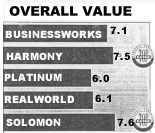| |

Although all the packages we reviewed enforced generally accepted
accounting principles, each was remarkably unique.
|
|
|
|
OVERALL VALUE
|
The composite of all the
tests and ratings.
We weighted
Practicality as 4,
Performance as 6,
and Price as 1 in
calculating Overall Value.
|
 |
Solomon and Harmony were the top-rated programs in our Overall Value chart,
with nearly identical overall ratings. This chart is a composite of all our
tests and ratings for the five modular accounting packages we evaluated. All
tests focused on the operation of the principle module of these packages, the
general ledger.
In calculating Overall Value, we gave slightly greater importance to performance
than to practicality. We weighed the Overall Performance results as 6, the Practicality
evaluations as 4, and Price as 1.
Final scores for Overall Value are extremely close because the packages with the most features tended to be
harder to use. We were pleasantly surprised at how easy both Harmony and Solomon were to learn and use, especially
considering that they are also rich in functionality.
Both programs did a good job of streamlining the complexiiy that's built in.
Solomon and Harmony are easy to learn and use,
yet they are also very rich in both features and functions
Solomon, which was Top Rated despite an annoying file locking scheme its manufacturer
claims is not actually copy protection, is a well designed, well documented,
and full featured package; it has an excellent support policy. Solomon is also
available in both OS/2 and network versions. Although the cost of Solomon is
high, the combination of power and flexibility make the program well worth the
price.
Harmony, also Top Rated, is slightly less ambitious than Solomon. While Solomon is targeted at businesses from medium-size to large, Harmony aims at small to
medium-size ones. Harmony beat out Solomon in every practicality issue except Support and Ease of Learning. However, fewer modules are available for Harmony,
and its reporting, data input, and posting features are slightly less flexible than Solomon's. The fact that no networked version of Harmony is available probably
rules it out for larger businesses. However, with a moderate price, Harmony would be an excellent choice for a medium-size business.
Manzanita's BusinessWorks PC came in third. BusinessWorks is more modest in
size, price, and expandability than Harmony. We rated its documentation worse
than Harmony's, but since BusinessWorks's on-screen prompting and help is as
good as Manzanita's, that's not a key issue. BusinessWorks' interactive intelligence
makes it a joy to use. Our only reservation about BusinessWorks is that too
little detail history is maintained on-line. For example, once a month has been
closed, none of the transactions for that month can be displayed. However, small
to medium-size businesses should consider the program; they can get the general
ledger, accounts payable, and accounts receivables modules for $695, less than
the cost of a single Solomon module.
RealWorld and Platinum are both feature-rich programs that are reminiscent of programs for minicomputers.
Businesses that are too big for Solomon, and there are many, should look into the networked version of Platinum.
Or, they should start with networked RealWorld and plan to upgrade to a minicomputer.
Both RealWorld and Platinum are due to be updated in early 1989. RealWorld is slated to receive a new, more inviting user interface;
Platinum will be getting new, improved documentation. Both these products need to be better adapted to the realities of
personal computers.
Most of the general ledger modules we reviewed require that a systems manager be installed before the programs will run. Thus,
where appropriate, we bundled the price of the systems manager with the price of the general ledger to determine
the price of the system reviewed. Please note that only one systems manager usually has to be purchased-one systems manager will run any and all modules in an accounting line.
It is possible for an integrated general ledger to support all the features and constraints required by GAAP (generally accepted accounting principles) and to be supportive and helpful to users as well. When shopping for an
accounting package, the size of the business is a primary concern. Once an accountant has determined that a package can handle a business of a certain size and complexity, make sure that the package can be used as effectively by
any programmers and data entry people who will be responsible for maintaining it as it can be by the accounting department that chooses it.
For more detailed information about the five integrated accounting packages described here, see the individual product evaluations in the pages that follow and the benchmark charts in the section after that.
-Emily Berk
|



